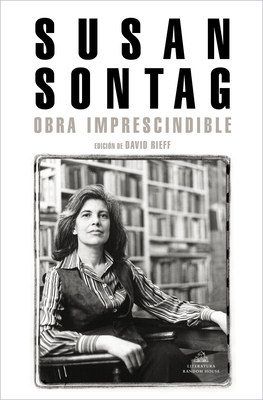
La mejor manera de conocer a Susan Sontag es leyéndola. Esta selección definitiva de su obra ha sido editada por David Rieff. El volumen reúne la obra imprescindible de una de las escritoras e intelectuales más trascendentales de la segunda mitad siglo XX. El crítico cultural e historiador David Rieff, hijo de la autora, ha antologado los escritos que conforman este libro basado, entre otros criterios, en lo que la propia Susan Sontag consideraba su obra más perdurable, así como en el eco que podrían suscitar algunos de ellos entre los lectores de la tercera década del siglo XXI. Los estudios, ensayos, artículos, relatos y fragmentos de las novelas y de los diarios se conjugan en esta compilación para ofrecer el retrato más sólido y fidedigno de su ejemplar y controvertida trayectoria. Destaca la incorporación de «El Tercer Mundo de las mujeres», nunca antes recogido en libro. Escrito hace medio siglo, analiza situaciones sociales y políticas feministas de permanente relevancia. En esta edición se incluyen asimismo fragmentos inéditos de los diarios de Sontag, sobre el sitio de Sarajevo o sobre la gestación de sus últimas novelas, que arrojan nueva luz sobre su sensibilidad y pensamiento. ENGLISH DESCRIPTION The best way to know Sontag is by reading her words. The ultimate selection of her works. This volume compiles the essential works of one of the most memorable and intellectual writers of the second half of the twentieth century. Cultural critic and historian David Rieff, Sontang’s son, has put together an anthology based—among other criteria—in what the own Susan Sontag considered her most enduring work, as well as the echo that some of those words might provoke among readers in the third decade of the twenty-first century. Studies, essays, articles, tales, and fragments of her novels and journals come together in this edition to present the most solid and accurate portrait of her exemplary and controversial career. The addition of “The Third World of Women” stands out, never before included in a book. Written half a century ago, it analyzes social situations and feminist policies still relevant today. Some unpublished fragments of Sontag’s journals are likewise included in this compilation, commenting on the siege of Sarajevo or the genesis of her last novels, casting a new light over her sensibility and mind.
Author

Susan Sontag was born in New York City on January 16, 1933, grew up in Tucson, Arizona, and attended high school in Los Angeles. She received her B.A. from the College of the University of Chicago and did graduate work in philosophy, literature, and theology at Harvard University and Saint Anne’s College, Oxford. Her books include four novels, The Benefactor, Death Kit, The Volcano Lover, and In America; a collection of short stories, I, etcetera; several plays, including Alice in Bed and Lady from the Sea; and nine works of nonfiction, starting with Against Interpretation and including On Photography, Illness as Metaphor, Where the Stress Falls, Regarding the Pain of Others, and At the Same Time. In 1982, Farrar, Straus & Giroux published A Susan Sontag Reader. Ms. Sontag wrote and directed four feature-length films: Duet for Cannibals (1969) and Brother Carl (1971), both in Sweden; Promised Lands (1974), made in Israel during the war of October 1973; and Unguided Tour (1983), from her short story of the same name, made in Italy. Her play Alice in Bed has had productions in the United States, Mexico, Germany, and Holland. Another play, Lady from the Sea, has been produced in Italy, France, Switzerland, Germany, and Korea. Ms. Sontag also directed plays in the United States and Europe, including a staging of Beckett's Waiting for Godot in the summer of 1993 in besieged Sarajevo, where she spent much of the time between early 1993 and 1996 and was made an honorary citizen of the city. A human rights activist for more than two decades, Ms. Sontag served from 1987 to 1989 as president of the American Center of PEN, the international writers’ organization dedicated to freedom of expression and the advancement of literature, from which platform she led a number of campaigns on behalf of persecuted and imprisoned writers. Her stories and essays appeared in newspapers, magazines, and literary publications all over the world, including The New York Times, The New Yorker, The New York Review of Books, The Times Literary Supplement, Art in America, Antaeus, Parnassus, The Threepenny Review, The Nation, and Granta. Her books have been translated into thirty-two languages. Among Ms. Sontag's many honors are the 2003 Peace Prize of the German Book Trade, the 2003 Prince of Asturias Prize, the 2001 Jerusalem Prize, the National Book Award for In America (2000), and the National Book Critics Circle Award for On Photography (1978). In 1992 she received the Malaparte Prize in Italy, and in 1999 she was named a Commandeur de l'Ordre des Arts et des Lettres by the French government (she had been named an Officier in the same order in 1984). Between 1990 and 1995 she was a MacArthur Fellow. Ms. Sontag died in New York City on December 28, 2004.